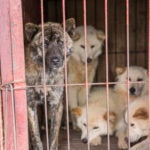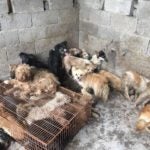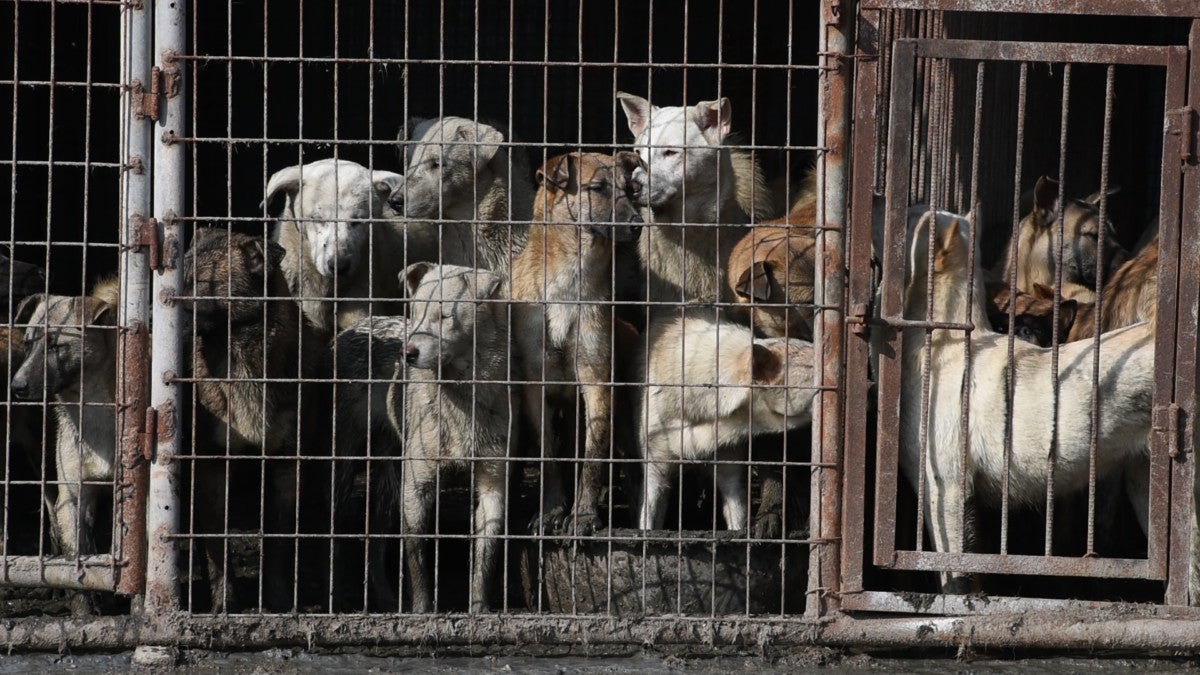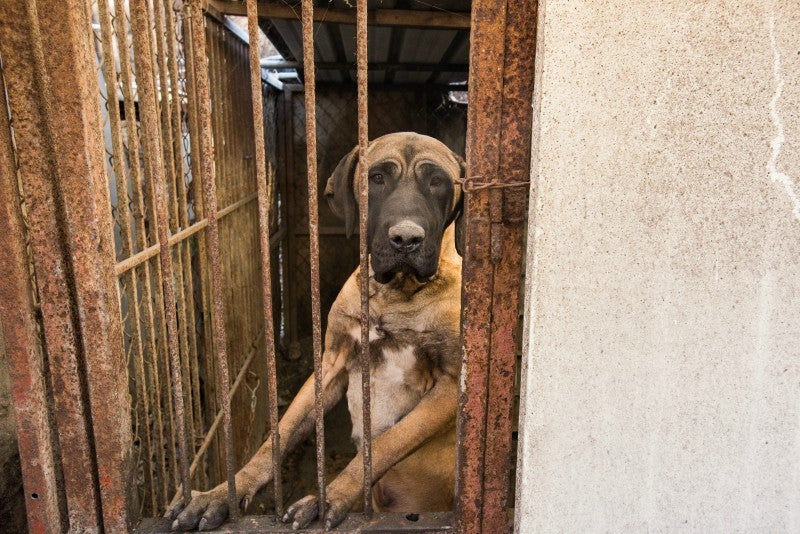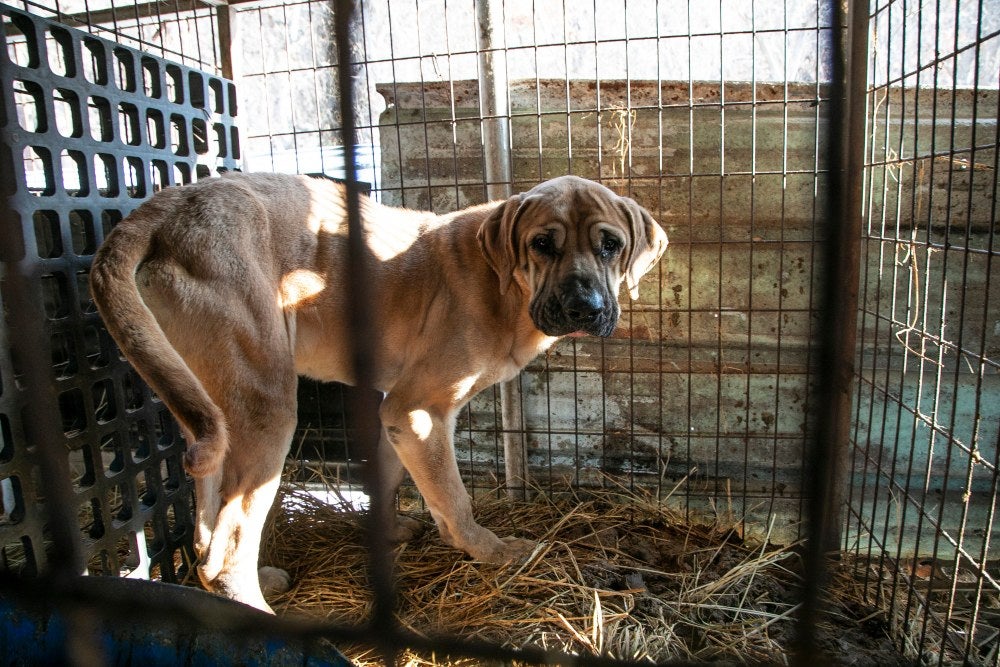
WASHINGTON—Humane Society International’s rescue team is on the ground in South Korea to save 90 dogs and puppies from the horrors of the dog meat trade and to bring them to the United States, Canada and the United Kingdom. Fifteen puppies will be arriving in the D.C. area on September 26 and 27, where they will be taken in by local shelter and rescue partners, such as the Animal Welfare League of Alexandria, the Fairfax County Animal Shelter and Homeward Trails Animal Rescue, to find new homes.
The dogs were living on a dog meat farm in Gyeonggi-do province that is closing thanks to HSI’s pioneering program that helps dog farmers who want to leave the increasingly controversial industry. This is the 15th dog farm HSI has permanently closed, and one of thousands of such farms across the country supplying live dogs to slaughterhouses and markets for human consumption.
The tosa and jindo breeds typical of the trade were kept at the farm alongside a chow-chow, golden retriever, several terrier mixes and two Boston terriers, all destined for slaughter. Most were enduring miserable lives in cramped and barren wire frame cages, while others were chained alone. The farmer, 40-year old Kwon Tae-young also admits to having sold puppies to dogfighters. Despite being illegal, dogfighting persists in South Korea, and HSI has discovered dogfighting rings at a number of the farms closed by the organization since the program began in 2015.
The farmer said: “I’ve thought about closing my dog farm for a while now for various reasons, but never actually did anything about it. I have lost more money on this dog farm than I have made, and I feel like the dog meat industry in South Korea has already ended really because it’s the worst of times for dog farmers I think. One day I talked to a former dog farmer who had worked with HSI and he recommended I work with them to help me leave the dog meat industry. Rather than selling them off to traders, I thought it would be so much better if they can live their life and not die for meat or live the life of a fighting dog. That why I’m working with HSI.”
HSI’s unique program works with dog farmers to rescue their dogs and transition their businesses to more humane and profitable enterprises such as crop growing or water delivery. The farmer signs a 20-year contract, stipulating they must not breed dogs or any animals again, and the cages are demolished to ensure that no animals will suffer on the property in future.
Nara Kim, HSI/Korea’s dog meat campaigner said: “More Koreans than ever before are speaking out against the dog meat industry, and pressure is building on the government to phase out this cruel business. As a Korean and an adopter of a dog meat trade survivor, I know what a difference HSI’s program can make in hastening an end to the suffering and what wonderful pets dog meat farm survivors can be when given a chance.”
Recent moves by authorities to curb the dog meat trade reflect how Korean society is increasingly ill at ease with the industry. In November 2018, HSI/Korea assisted the Seongnam city council in shutting down Taepyeong, the largest dog slaughterhouse in the country, and in July this year HSI/Korea worked with other Korean animal groups and the Busan city council to close down the Gupo dog meat market.
As political and public momentum grows in South Korea to end the dog meat trade, HSI’s strategy points to the need for a solution that works for both people and dogs caught up in the industry. The organization hopes its program will demonstrate to the government that the group’s voluntary phase-out model can be adopted nationwide with state support and can end the industry for good.
Facts:
- An estimated 2 million dogs a year are reared on thousands of dog meat farms across South Korea.
- Dogs are mainly killed by electrocution, taking up to five minutes to die. Hanging is also practiced despite being illegal.
- Dog meat consumption is declining rapidly in South Korea, particularly among younger generations. According to a June 2018 survey by Gallup Korea, 70% of South Koreans say they will not eat dog meat in future.
- Most people in South Korea don’t regularly eat dog, but it remains popular during the Bok days of summer (Bok Nal) in July and August, when it is eaten as a soup called bosintang.
- The dog meat industry is in legal limbo in South Korea, neither legal nor illegal. Many provisions of the Animal Protection Act are routinely breached, such as the ban on killing animals in a brutal way including hanging by the neck, and on killing them in public areas or in front of other animals of the same species.
- At each dog meat farm closure, HSI’s veterinarian vaccinates all the dogs against the H3N2 (dog flu) virus, rabies, DHPP, corona virus, distemper and parvo. HSI then quarantines the dogs on the farm or at a temporary shelter with no dogs permitted in or out for at least 30 days prior to transport overseas.
Video and photos of the dogs on the farm are available here and here.
END
Media contacts:
- Humane Society International: Nancy Hwa in Washington, D.C., nhwa@hsi.org, 202-676-2337 (direct), 202-596-0808 (cell)
- Animal Welfare League of Alexandria: Gina Hardter, Director of Marketing & Communications, ghardter@alexandriaanimals.org, 703-746-5662
- Fairfax County Animal Shelter: Karen Diviney, Karen.Diviney@fairfaxcounty.gov
- Homeward Trails Animal Rescue: info@homewardtrails.org

